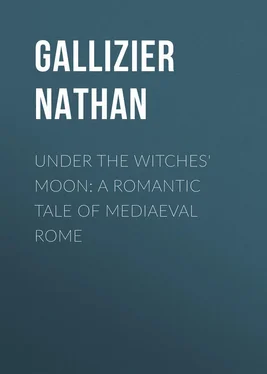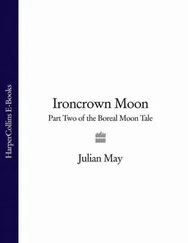Nathan Gallizier - Under the Witches' Moon - A Romantic Tale of Mediaeval Rome
Здесь есть возможность читать онлайн «Nathan Gallizier - Under the Witches' Moon - A Romantic Tale of Mediaeval Rome» — ознакомительный отрывок электронной книги совершенно бесплатно, а после прочтения отрывка купить полную версию. В некоторых случаях можно слушать аудио, скачать через торрент в формате fb2 и присутствует краткое содержание. Издательство: Иностранный паблик, Жанр: foreign_antique, foreign_prose, на английском языке. Описание произведения, (предисловие) а так же отзывы посетителей доступны на портале библиотеки ЛибКат.
- Название:Under the Witches' Moon: A Romantic Tale of Mediaeval Rome
- Автор:
- Издательство:Иностранный паблик
- Жанр:
- Год:неизвестен
- ISBN:нет данных
- Рейтинг книги:4 / 5. Голосов: 1
-
Избранное:Добавить в избранное
- Отзывы:
-
Ваша оценка:
- 80
- 1
- 2
- 3
- 4
- 5
Under the Witches' Moon: A Romantic Tale of Mediaeval Rome: краткое содержание, описание и аннотация
Предлагаем к чтению аннотацию, описание, краткое содержание или предисловие (зависит от того, что написал сам автор книги «Under the Witches' Moon: A Romantic Tale of Mediaeval Rome»). Если вы не нашли необходимую информацию о книге — напишите в комментариях, мы постараемся отыскать её.
Under the Witches' Moon: A Romantic Tale of Mediaeval Rome — читать онлайн ознакомительный отрывок
Ниже представлен текст книги, разбитый по страницам. Система сохранения места последней прочитанной страницы, позволяет с удобством читать онлайн бесплатно книгу «Under the Witches' Moon: A Romantic Tale of Mediaeval Rome», без необходимости каждый раз заново искать на чём Вы остановились. Поставьте закладку, и сможете в любой момент перейти на страницу, на которой закончили чтение.
Интервал:
Закладка:
She gave a shrug.
"If it be so," she said wearily, "so let it be. Nevertheless, I know whereof I speak. This thing has stolen over us like a madness. And, like a madness, it will hurl us to our doom."
Though he had seen the dark, glowering face among the branches, he said nothing, not to alarm her, not to cause her fear and misgiving. He loved her spotless purity as dearly as herself. To him they were inseparable.
His head fell forward on her hands. Her fingers played in his soft brown hair.
"What would you have me do?" he said, his voice choked by his anguish.
"Go on a pilgrimage to Rome, to obtain forgiveness, as I shall visit the holy shrines of Mont Beliard and do likewise," she said, steadying her voice with an effort. "Let us forget that we have ever met – that we have ever loved, – or remember that we loved – a dream." —
"Can love forget so readily?" he said, bitter anguish and reproach in his tones.
She shook her head.
"It is my fate, – for better – or worse – no matter what befall. As for you – life lies before you. Love another, happier woman, one that is free to give – and to receive. As for me – "
She paused and covered her face with her hands.
"What will you do?" he cried in his overmastering anguish.
A faint, far-off voice made reply.
"I shall do that which I must!"
He staggered away from her. She should not see the scalding tears that coursed down his cheeks. But, as he turned, he again saw the dark and glowering face, the brow gloomy as a thunder-cloud, of the Count de Laval. But again it was not he. It was the black-garbed, lithe stranger, the companion of the hunchback, who was regarding Hellayne with evil, leering eyes.
He wanted to cry out, warn her, entreat her to fly. —
But it was too late.
Like a bird that watches spellbound the approach of the snake, Hellayne stood pale and trembling – her cheeks white as death – her eyes riveted on the evil shape that seemed the fiend. But he, Tristan, also was encompassed by the same spell. He could not move – he could not cry out. With a bound, swift and noiseless as the panther's, he saw the sinewy stranger hurl himself upon Hellayne, picking her up like a feather and disappear in the gloom of the forest.
With a cry of horror, bathed from head to foot in perspiration, Tristan started from his slumber.
The moonbeams flooded the chamber. The soft breeze of the summer night stole through the open casement.
With a moan as of mortal pain he sat up and looked about.
Was he indeed in Rome?
Had it been but a dream, this echo of the past, this visualized parting from the woman he had loved better than life?
Was he indeed in Rome, to do as she had bid him do, not in the misty, flower-scented rose-gardens of Avalon in far Provence? —
And she – Hellayne – where was she at this hour?
Tristan stroked his clammy brow with a hot, dry hand. For a moment the memories evoked by the magic wand of the God of Sleep seemed to banish all consciousness of the present. He cast a fleeting, bewildered glance at the dim, distant housetops, then fell back among his cushions, his lips muttering the name of her who had filled his dream with her never-to-be-forgotten presence, wondering and questioning if they would ever meet again. Thus he tossed and tossed.
After a time he became still.
Once again consciousness was blotted out and the dream realm reigned supreme.
CHAPTER IV
THE WAY OF THE CROSS
It was late on the following morning when Tristan waked. The sun was high in the heavens and the perfumes from a thousand gardens were wafted to his nostrils. He looked about bewildered. The dream phantoms of the night still held his senses captive, and it was some time ere he came to a realization of the present. In the dream of the night he had lived over a scene in the past, conjuring back the memory of one who had sent him on the Way of the Cross. The pitiless rays of the Roman sun, which began to envelop the white houses and walls, brought with them the realization of the present hour. He had come to Rome to do penance, to start life anew and to forget. So she had bade him do on that never-to-be forgotten eve of their parting. So she had willed it, and he had obeyed.
How it all flooded back to him again in waves of anguish, the memory of those days when the turrets of Avalon had faded from his aching sight, when, together with a motley pilgrims' throng, he had tramped the dusty sun-baked road, dead to all about him save the love that was cushioned in his heart. How that parting from Hellayne still dominated all other events, even though life and the world had fallen away from him and he had only prayer for oblivion, for obliteration.
Yet even Hellayne's inexorable decree would not have availed to speed him on a pilgrimage so fraught with hopelessness, that during all that long journey Tristan hardly exchanged word or greeting with his fellow pilgrims. It was her resolve, unfalteringly avowed, to leave the world and enter a convent, if he refused to obey, which had eventually compelled. Her own self-imposed penance should henceforth be to live, lonely and heartbroken, by the side of an unbeloved consort, while Tristan atoned far away, in the city of the popes, at the shrines of the saints.
At night, when Tristan retired, at dawn, when he arose, Hellayne's memory was with him, and every league that increased the distance between them seemed to heighten his love and his anguish. But human endurance has its limits, and at last he was seized by a great torpor, a chill indifference that swept away and deadened every other feeling. There was no longer a To-day, no longer a Yesterday, no longer a To-morrow.
Such was Tristan's state of mind, when from the Tiburtine road he first sighted the walls and towers of Rome, without definite purpose or aim, drawn along, as it were, towards an uncertain goal by Fate's invisible hand. Utterly indifferent as to what might befall among the Seven Hills, he was at times dimly conscious of a presentiment that ultimately he would end up his own days in one of those silent places where all earthly hopes and desires are forever stilled. So much was clear to him. Like the rest of the pilgrims who had wended their way to St. Peter's seat, he would complete the circuit of the holy shrines, kiss the feet of the Father of Christendom, do such penance as the Pontiff should impose, and then attach himself to one party or another in the pontifical city which held out hope for action, since the return to his own native land was barred to him for evermore.
How he would bear up under the ordeal he did not know. How he would support life away from Hellayne, without a word, a message, without the assurance that all was well with her, whether now, his own fate accomplished, others thronged about her in love and adulation, – he knew not.
For the nonce he was resolved to let new scenes, new impressions sweep away the great void of an aching heart, lighten the despair that filled his soul.
In approaching the Eternal City he had felt scarcely any of the elevation of spirit which has affected so many devout pilgrims. He knew it was the seat of God's earthly Vice-regent, the capital of the universal kingdom of the Church. He reminded himself of this and of the priceless relics it contained, the tombs of the Apostles St. Peter and St. Paul, the tombs of so many other martyrs, pontiffs and saints.
But in spite of all these memories he drew near the place with a sinking dread, as if, by some instinct of premonition, he felt himself dragged to the Cross on which at last he was to be crucified.
Many a pilgrim may have seen Rome for the first time with an involuntary recollection of her past, with the hope that for him, too, the future might hold the highest greatness.
Читать дальшеИнтервал:
Закладка:
Похожие книги на «Under the Witches' Moon: A Romantic Tale of Mediaeval Rome»
Представляем Вашему вниманию похожие книги на «Under the Witches' Moon: A Romantic Tale of Mediaeval Rome» списком для выбора. Мы отобрали схожую по названию и смыслу литературу в надежде предоставить читателям больше вариантов отыскать новые, интересные, ещё непрочитанные произведения.
Обсуждение, отзывы о книге «Under the Witches' Moon: A Romantic Tale of Mediaeval Rome» и просто собственные мнения читателей. Оставьте ваши комментарии, напишите, что Вы думаете о произведении, его смысле или главных героях. Укажите что конкретно понравилось, а что нет, и почему Вы так считаете.












